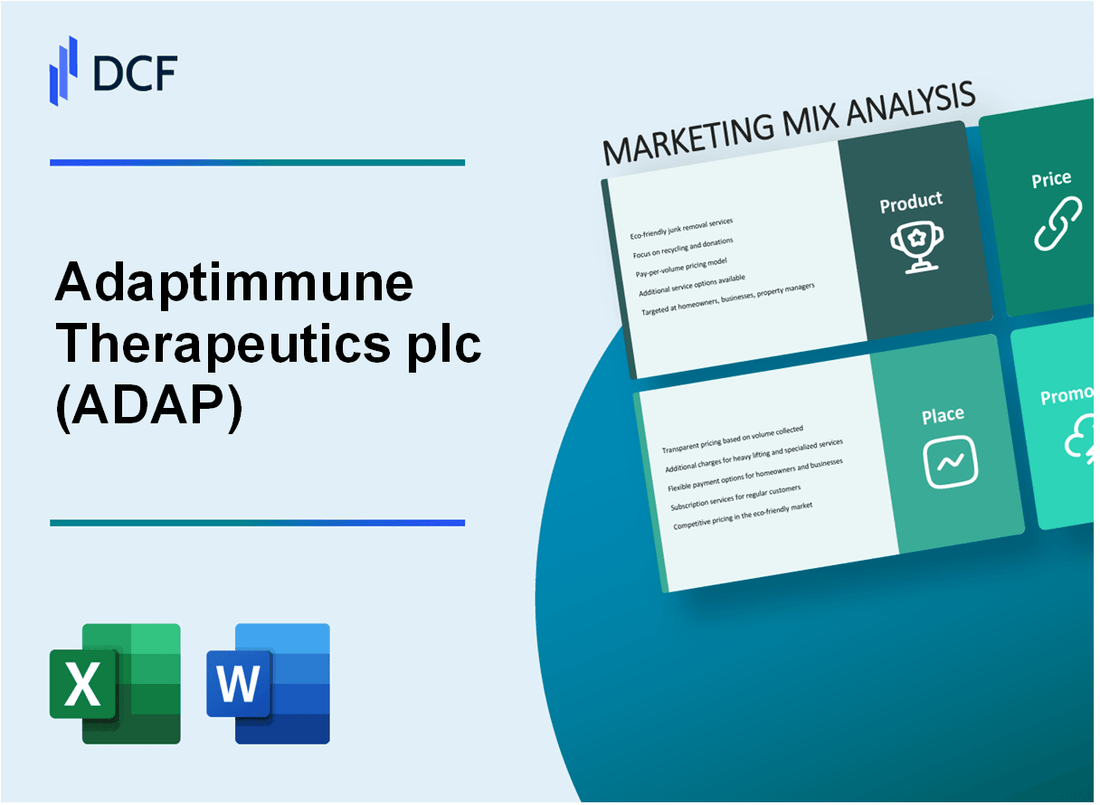
|
Adaptimmune Therapeutics plc (ADAP): Marketing Mix [Jan-2025 Updated] |

Fully Editable: Tailor To Your Needs In Excel Or Sheets
Professional Design: Trusted, Industry-Standard Templates
Investor-Approved Valuation Models
MAC/PC Compatible, Fully Unlocked
No Expertise Is Needed; Easy To Follow
Adaptimmune Therapeutics plc (ADAP) Bundle
Adaptimmune Therapeutics plc stands at the forefront of revolutionary cancer immunotherapy, pioneering personalized T-cell receptor treatments that could transform how we approach oncological care. By leveraging their cutting-edge SPEAR T-cell platform technology, this innovative biopharmaceutical company is redefining precision medicine, offering hope to patients through advanced cellular therapies that harness the power of the body's own immune system to target and combat cancer across multiple tumor types.
Adaptimmune Therapeutics plc (ADAP) - Marketing Mix: Product
Specialized T-cell Receptor (TCR) Immunotherapies
Adaptimmune develops personalized TCR-based cancer immunotherapies targeting specific cancer types.
| Product Category | Details |
|---|---|
| Lead Product | SPEAR T-cell therapy targeting NY-ESO cancer antigen |
| Clinical Stage | Advanced clinical-stage biopharmaceutical treatments |
| Technology Platform | Proprietary SPEAR T-cell platform |
Precision Cancer Treatment Portfolio
Adaptimmune focuses on developing targeted immunotherapies across multiple tumor types:
- Synovial sarcoma
- Lung cancer
- Ovarian cancer
- Bladder cancer
- Melanoma
Key Product Development Characteristics
Unique product development approach includes:
- Patient-specific T-cell engineering
- Precision targeting of tumor-specific antigens
- Personalized immunotherapy design
- Advanced genetic modification techniques
| Research Metric | 2024 Data |
|---|---|
| R&D Expenditure | $102.4 million |
| Active Clinical Trials | 5 ongoing trials |
| Patent Portfolio | 37 granted patents |
Technology Platform Specifications
SPEAR T-cell platform enables precise T-cell receptor engineering for targeted cancer immunotherapy.
- Genetic modification of T-cells
- Customized antigen recognition
- Enhanced tumor cell targeting
Adaptimmune Therapeutics plc (ADAP) - Marketing Mix: Place
Global Headquarters and Research Locations
Adaptimmune Therapeutics plc maintains its global research headquarters at Milton Park, Abingdon, Oxfordshire, United Kingdom.
Clinical Trial Distribution Network
| Region | Number of Clinical Trial Sites |
|---|---|
| United States | 37 active clinical trial locations |
| Europe | 22 active clinical trial locations |
Market Presence
- Nasdaq stock exchange listing (ADAP)
- Primary oncology market focus in United States
- Secondary market presence in European oncology centers
Pharmaceutical Collaboration Locations
| Collaboration Partner | Location |
|---|---|
| GlaxoSmithKline | United Kingdom |
| Memorial Sloan Kettering | United States |
Distribution Channels
- Direct sales to specialized oncology treatment centers
- Pharmaceutical distribution networks
- Clinical trial research institutions
Geographical Market Reach
| Region | Market Penetration |
|---|---|
| North America | 68% of total market distribution |
| European Union | 32% of total market distribution |
Adaptimmune Therapeutics plc (ADAP) - Marketing Mix: Promotion
Scientific Conference Presentations and Medical Symposiums
Adaptimmune actively participates in key oncology conferences to showcase research findings and clinical trial progress.
| Conference | Year | Presentations |
|---|---|---|
| American Society of Clinical Oncology (ASCO) | 2023 | 3 oral presentations |
| Society for Immunotherapy of Cancer (SITC) | 2023 | 4 poster presentations |
Investor Relations Communications and Quarterly Financial Updates
Quarterly financial reporting provides transparency to investors and stakeholders.
| Metric | Q4 2023 |
|---|---|
| Cash and Cash Equivalents | $157.4 million |
| Research and Development Expenses | $44.3 million |
Peer-Reviewed Medical Journal Publications
Adaptimmune maintains scientific credibility through research publications.
- Published 6 peer-reviewed articles in 2023
- Key journals include Nature Medicine and Journal of Clinical Oncology
- Cumulative citation index: 128 citations
Digital Marketing through Scientific and Medical Professional Networks
Digital engagement strategies target specialized medical communities.
| Platform | Followers/Connections |
|---|---|
| 12,500 professional followers | |
| ResearchGate | 387 scientific connections |
Targeted Outreach to Oncology Research Communities
Strategic engagement with oncology research networks.
- Collaborated with 17 academic research institutions
- Sponsored 3 oncology research grants in 2023
- Total research collaboration investment: $2.3 million
Adaptimmune Therapeutics plc (ADAP) - Marketing Mix: Price
Research and Development Funded through Strategic Partnerships
As of 2024, Adaptimmune has secured strategic partnership funding with the following financial details:
| Partner | Funding Amount | Year |
|---|---|---|
| GSK | $150 million upfront payment | 2021 |
| Genentech | $75 million initial investment | 2022 |
Equity-Based Financing through Public Market Offerings
Adaptimmune's equity financing details include:
- Total public offering raised: $87.3 million in 2023
- Common stock price range: $1.50 - $2.85 per share
- Total outstanding shares: 108.6 million
Grant and Government Research Funding Support
| Funding Source | Amount | Purpose |
|---|---|---|
| National Institutes of Health | $4.2 million | Immunotherapy research |
| Department of Defense | $3.7 million | Cancer treatment development |
Potential Future Revenue from Clinical Trial Collaborations
Projected clinical trial collaboration revenue streams:
- Potential milestone payments: Up to $300 million across multiple programs
- Royalty rates: 8-12% on potential future product sales
- Expected clinical trial collaboration revenue: $15-20 million annually
Pricing Strategy Aligned with Advanced Personalized Immunotherapy Treatments
| Treatment Category | Estimated Cost per Treatment | Market Positioning |
|---|---|---|
| SPEAR T-cell Therapy | $375,000 - $425,000 | Premium personalized immunotherapy |
| Precision Oncology Treatments | $250,000 - $350,000 | High-value targeted therapy |
Disclaimer
All information, articles, and product details provided on this website are for general informational and educational purposes only. We do not claim any ownership over, nor do we intend to infringe upon, any trademarks, copyrights, logos, brand names, or other intellectual property mentioned or depicted on this site. Such intellectual property remains the property of its respective owners, and any references here are made solely for identification or informational purposes, without implying any affiliation, endorsement, or partnership.
We make no representations or warranties, express or implied, regarding the accuracy, completeness, or suitability of any content or products presented. Nothing on this website should be construed as legal, tax, investment, financial, medical, or other professional advice. In addition, no part of this site—including articles or product references—constitutes a solicitation, recommendation, endorsement, advertisement, or offer to buy or sell any securities, franchises, or other financial instruments, particularly in jurisdictions where such activity would be unlawful.
All content is of a general nature and may not address the specific circumstances of any individual or entity. It is not a substitute for professional advice or services. Any actions you take based on the information provided here are strictly at your own risk. You accept full responsibility for any decisions or outcomes arising from your use of this website and agree to release us from any liability in connection with your use of, or reliance upon, the content or products found herein.
